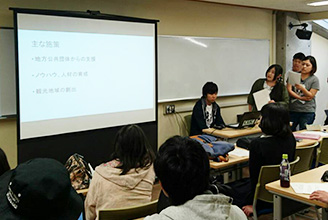We look forward to the participation of curious individuals who want to see the actual business operations, hear from managers, and take part in a serious challenge to present business improvement proposals directly to managers!
Research Themes
When asked what corporate management is, managers of small and medium-sized enterprises unanimously cite three elements: "Art (intuition and vision)," "Science," and "Luck." Management scholar Mintzberg also stresses the importance of "Art (intuition and vision)," "Science (analysis and evaluation)," and "Craft (experience)" as the three elements necessary for management, and of the importance of Craft education, particularly in MBA (management school) programs. This shows that management cannot be practiced through science and analysis alone, as excellent management scholars (those with a science related to management) do not necessarily become excellent executives or managers.
Therefore, we will adopt a learning method of business management theory seen from the field. By applying theories and methods (science) learned at the desk to business diagnosis at the field (small and medium-sized manufacturing factories, shopping streets, and stores), you will master the intuition and vision of a manager (art) and management seen from the field (experience). We believe this seminar is ideal for those who aim to become small and medium-sized business management consultants and those who plan to take over their parents' companies in the future. By practicing mini-business diagnosis, you will be able to gain a more complete understanding of the content that cannot be fully acquired through desk study alone.
Activities
Rather than being confined to armchair theories and methods, the course places emphasis on the process of on-site observation ⇒ problem identification ⇒ consideration of solutions to these issues, and teaches the basics of management diagnosis for small and medium-sized enterprises and venture businesses.
- (1) While shopping districts across the country are in a slump, we visited advanced shopping districts that have survived and analyzed the factors behind their success and the challenges they face
- (2) Visiting a collaborative incubation program between universities and support organizations to learn about the success factors and support methods for venture businesses
- (3) Learn the basics of store management diagnosis (environmental analysis, trade area analysis, product lineup, store layout, sales and purchasing management)
- (4) Learn the basics of management diagnosis in the manufacturing industry (environmental analysis, production management, quality control, cost management, human resource management)
- (5) During the summer and spring holidays, we plan to hold voluntary seminars for intensive on-site corporate diagnostic training (in manufacturing, shopping districts, and stores) for about five days.


Student Voices
Department of Business Administration Eiji Kanesugi
Suzuki's seminar is a new seminar with only 19 second-year students, and it focuses on fieldwork (research conducted by actually visiting the shopping district). Students have the opportunity to hear from actual employees and managers, as well as small business management consultants who support the town, and learn business management in the field. Some of the seminar students aim to become managers, while others aim to become small business management consultants, tax accountants, or certified public accountants, and they help each other improve.
Department of Business Administration Tatsuki Nagashima
In this seminar, students are divided into groups and each group visits a nearby shopping district and small and medium-sized businesses. By actually going to the site, listening to the people in the shopping district, and summarizing what they have seen and heard, students become very friendly with each other. Through practical experience with their seminar classmates, students can enjoy the class.